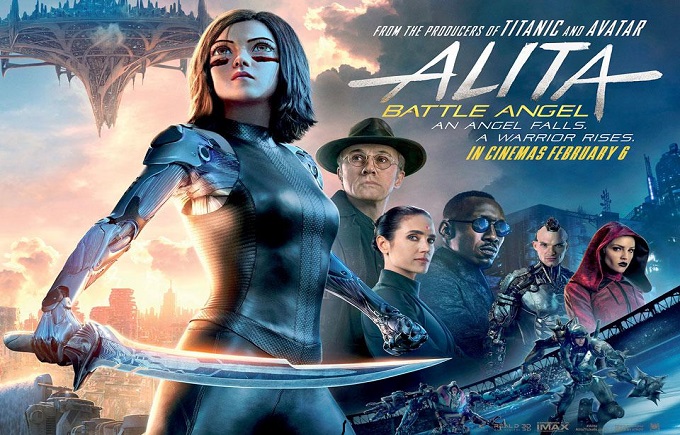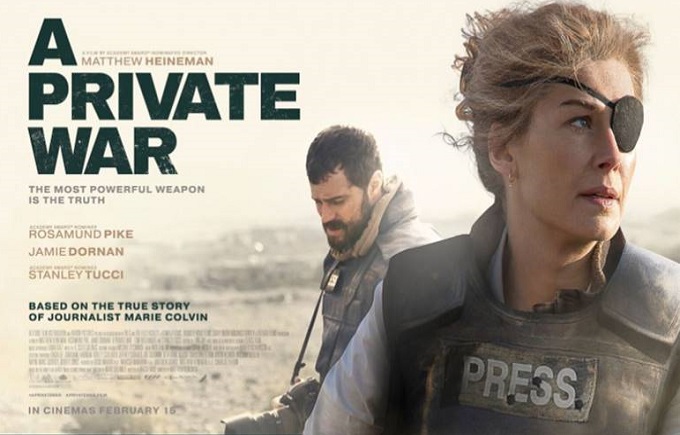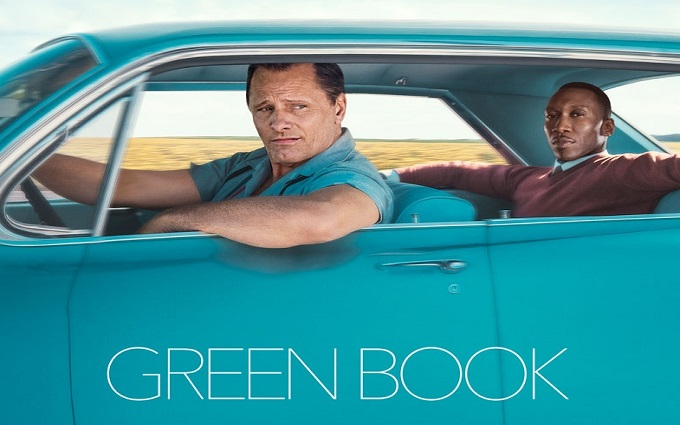Alita Battle Angel Review

The Plot
A mysterious young girl wakes up in a cyborg body in the distant future of the 26th century where man and machine have largely become one. On a quest to reclaim her own forgotten past, she meets a fantastic array of friends and foes alike as she explores the vast lawless slum sitting beneath a Utopian city in the sky.
The Good
Fans of the original Manga series and the anime aesthetic in general will be delighted to finally see a live action adaptation that at last does faithful justice to the distinctive look and feel of anime. After many decades of patience for filmmakers and audiences, special effects has finally mostly caught up with the wildly imaginative worlds of Japanese animation. Allowing the genre’s iconic cyberpunk creations to be realised on screen more photo-realistically than ever before.
Alita is a labour of love for writer and producer James Cameron, who has spent two decades striving to make this project a blockbuster reality. His trademark flare for turning fantastical future tech into an exciting action packed reality remains very much in evidence. Armed with a vast budget and iconic source material Cameron and director Robert Rodriguez have crafted a truly dazzling post-apocalyptic world where super powered cyborgs, decaying ruins and glittering cities in the sky coexist convincingly. The attention to detail and the lived in feel of Alita’s world largely succeeds in immersing audiences.
Relative newcomer Rosa Salazar does well to make titular heroine Alita a captivating figure. She does well at balancing both sides of Alita’s complex personality. She is equally earnest playing her naïve young wide eyed wonder and then as required transforming into a confident indestructible cyborg super soldier. Salazar’s own face transformed by painstaking CGI into a literal embodiment of the original anime character remains reassuring capable of genuine emotion. Most importantly her endearing performance keeps Alita distinctly human.
Christoph Waltz is on typically fine form as the kind hearted cyber doctor who adopts a fatherly role in rescuing Alita and guiding her on her journey of self-discovery. The sincerely sweet natured affection between him and Salazar’s Alita is a nice contrast to the generally brutal world around them and gives the film a steady emotional centre.
In truth though the film’s most valuable assets are its action set pieces. Deadly battle between weird and wonderful mechanical warriors gives audiences a truly original and spectacular spectacle. During these sequences audiences can revel in the dazzling visuals fully and bask in the film’s very best big budget attributes.
The Bad
While Rosa Salazar does a fairly good job at making Alita an endearing presence in the film, the fact that the character is fully CGI with dramatically overly enlarged eyes is at time a little jarring and unconvincing. In certain shots it looks obviously cartoonish and masks what might well have originally been a decent emotional performance. With so much of the film’s settings and characters necessarily artificial it may have been a better choice to at least leave the main character with a more authentically human face.
In a similar fashion, the other cyborg characters which populate the world of Alita are well designed and stick close to the source material, however at times it’s difficult to avoid being distracted by how odd it is to see perfectly ordinary human faces superimposed onto elaborate robotic bodies. Some will be impressed by this distinctive imagery, others will find it creepy and more clearly fake.
While the film boasts a mostly solid cast of familiar stars, unfortunately newcomer Keean Johnson proves to be a little ill-equipped for his considerable screen time. As Alita’s love interest Hugo he is a mostly bland presence, robbing the film of credible romance.
In truth the entire cast struggles a little at times, doing their best to work through heavy handed exposition and oddly soulless emotional exchanges. It really doesn’t help that Robert Rodriguez is a director well known for prioritising slick CGI style over emotional substance. Oddly given the films dark visuals and hyper violent action, the film’s acting and narrative style almost seems skewed toward a younger less sophisticated audience. A side effect of its unexpected pg13 rating,
One of the biggest complaints casual audiences may have by the end of the film is that it’s abundantly clear that key plot points, characters and some of the most potentially interesting parts of Alita’s world have been purposefully held back for what is assumed to be inevitable sequels. Time and ticket sales will prove whether or not this confidence at launching a new franchise has been misplaced or not. For now what it does mean is that this film feels far from complete and functions more as a lengthy exercise in initial world building rather than delivering a self-contained story.
It’s worrying that after over 20 years of planning and endless development screenwriter James Cameron has only been able to produce a lacklustre script peppered with heavy handed dialogue and predictably lazy clichés. Much like his box office record breaker Avatar, Cameron delivers high tech style largely lacking in substance. It’s a cause for concern as the world awaits his never ending series of seemingly unnecessary Avatar sequels. His chronic preoccupation with special effects and obsessively pushing the limits of CGI is becoming an obvious problem.
This film only serves to cast further doubt about whether or not the once essential Cameron is actually capable of recapturing the undisputed blockbuster greatness of his early work, now an increasingly fading memory from the 1990s…
The Ugly Truth
Alita Battle Angel has some unquestionably well-polished and original visuals, used to create several entertaining action set pieces. Unfortunately a threadbare plot, a few awkward performances and holding too much in reserve for possible future instalments handicaps audience satisfaction. Alita will be a welcomed delight for long term Anime fans and anyone with a particular fondness for this character and the cyberpunk genre. It succeeds far more than any previous live action adaptation of Japanese animation, even if it isn’t quite perfect.
Review by Russell Nelson
A Private War Review

The Plot
The work of celebrated war correspondent Marie Colvin is dramatically brought to life, following her triumphs and troubles as she relentlessly brought the world stories from some of the most dangerous war torn conflict zones on the planet. Her determination to give a voice to voiceless victims matched only by her own pain and the ultimately tragic consequences of her wanton fearlessness
The Good
Rosamund Pike physically and vocally captures Marie Colvin to perfection. Her distinctive voice, mannerisms and scars are all authentically on show for audiences to either admire or pity. Pike has always been well regarded as dramatic actress with considerable screen presence, but this surely represents some of her very finest work. She delivers a fearless performance as an equally bold and broken woman, haunted by the physical and psychological damage her chosen profession incrementally inflicts upon her.
The film’s main success is in accurately recreating the war zone environments in which Marie Colvin spent most of her professional life. Embedding audiences in the most hostile human environments in precisely the same way war correspondents choose to in real life. It’s sobering and serious material that can’t help but have an emotional impact on those watching. This is most certainly not a film that glamourizes war and its cataclysmic human cost in the way Hollywood is most typically accused of doing.
Around Pike’s determined leading performance, a strong supporting cast boasting the likes of Stanley Tucci, Jamie Dornan and Tom Hollander also deliver accomplished performances. The always compelling Tom Hollander in particular is required to give voice most often to the film’s explicit assessment of what Marie Colvin did and why it matters so much. Thanks to their capable hands, the potentially heavy handed dialogue and moralising, feel at least a little more sincere and earnestly delivered.
In terms of sincerity, having the film open and close with the real Marie Colvin expressing her relentless passion for journalism in her own words is an especially poignant and impactful gesture.
The Bad
There will no doubt be many who find it hard to identify or sympathise with those who choose to insert themselves knowingly into life or death situations merely to report a story. Some people will surely find Marie Colvin hard to relate too, feeling baffled by why she persisted in pursing stories from war zones, with ever greater personal peril.
As with people who climb mountains or throw themselves out of planes for fun, there is a uniquely brave and reckless mind-set required for such activities which few people possess. While that might be inspiring or admirable to some people, for others it will just always appear to be selfishly self-destructive. Those people will of course find Marie Colvin’s own story less compelling or comprehensible.
The film is also difficult to watch because it essentially showcases the gradual mental and physical disintegration of an award winning journalist in pursuit of her career. Witnessing her inevitable collapse is slow and painful on screen making the film feel at times more an exercise in endurance than entertainment. Some audiences will consider that part of the message of the film and find that damaged insight compelling, others may struggle more with that grim reminder of reality.
The Ugly Truth
A Private War is a bitingly honest and evocative portrait of a woman sacrificing everything for the cause of journalism. Whether audiences value or understand that decision making, it’s still interesting to see someone making that ultimate sacrifice.
Review by Russell Nelson
The Kid Who Would Be King Review

The Plot
A bullied schoolboy finds a magical sword, throwing him unexpectedly into a century’s long magical battle between good and evil. Forcing him and his fellow students to become the most unlikely heroes the world needs during its darkest hour.
The Good
Writer director Joe Cornish has had notable success before in fusing the fantastic with regular British teens. His big screen directorial debut Attack the Block showed considerable promise in combining clever ideas and a well-planned use of a modest budget, to make a truly original slice of sci-fi action comedy. This new film ambitiously attempts to do the same with the fantasy genre and at times show flashes of genuine genius.
Cornish combines irreverent self-aware laughs with some surprisingly original reimagining’s of the well-known legend of King Arthur. Having the lady of the lake dispensing Excalibur from a hastily filled bathtub and a youthful Merlin scrounging magical ingredients from fast food is just a small sample of some of the unexpected moments the film generates. The film’s creature design, visual effects and unique interpretation of magical conjuring are all equally well polished and satisfying. Despite an initially quaint setting, the film clearly has both a big budget and big aspirations.
The film also boast at least a few familiar faces, with Sir Patrick Stewart lending his considerable gravitas to proceedings, essentially guiding the film on track at key moment through narration and frequent cameos. His extremely welcome presence elevates the tone and the quality of his young co-stars performances.
Mission Impossible and The Greatest Showman star Rebecca Ferguson also does her very best to provide the film with a memorably menacing magical villain. She clearly spent countless hours working with makeup and special effects specialists undergoing a convincingly creepy physical transformation. Even through all those layers of prosthetics and CGI her arresting talent still shines through.
Special mention must go to relative newcomer Angus Imrie. His wide eyed and consistently hilarious performance as a teenage wizard is authentically brilliant. He plays Merlin like a magical adolescent cross between Doctor Who and Jack Sparrow. Every time he’s on screen the film get far more fun and he’s clearly a star to watch out for in the future.
The Bad
Despite plenty of clever ideas, convincing effects and some truly great performance, unfortunately The Kid Who Would Be King doesn’t quite seem to always hit the mark, for reasons that are frustratingly hard to immediately identify.
One issue might be that the Arthurian legend of the Knights of the Round Table no longer holds quite the same mystery and fun it once did. Having been plundered far too often by lazy storytellers it’s simply impossible to avoid those underwhelming feelings of overfamiliarity. At this point even the Transformers have clumsily borrowed Arthur’s legend. It’s hard to imagine people having much appetite for yet another reinvention of this oldest of myths. Likewise, heroic knights in clunky medieval armour must also now compete with the amazing array of comic book superheroes capturing kids’ imaginations these days.
On that point, another issue the film has is just how juvenile its main cast are. It’s difficult to truly take baby-faced 12 year old boys seriously as action heroes. If anything the sight of a crowd of prepubescent children in knight outfits feels more like a fancy dress birthday party than a brave army. This may be why the film sometimes feels slightly silly, despite being packed with inventive ideas and otherwise accomplished storytelling. In truth having older might have helped the film have a wider and more consistent appeal beyond a very young audience.
The Ugly Truth
The Kid Who Would be King has flashes of brilliance that make it a generally enjoyable fantasy adventure. Younger British audiences in particular will welcome seeing themselves as heroes for a change.
Review by Russell Nelson
Serenity Review

The Plot
A fishing boat captain living on a remote island paradise struggles with his own mysterious past as the world around him seems to slowly unravel.
The Good
This tropical thriller has assembled a truly all-star cast that represents a genuine bounty of acting talents. Leading man Matthew McConaughey has frequently proven himself charismatically capable of carrying entire films almost single handily. He does his very best to try and inject some genuine mystery and thoughtfulness into proceedings. Jason Clarke, Djimon Hounsou, Diane Lane and Anne Hathaway provide some much needed support. The presence of so many familiar faces and a steamy island setting does at least keep the film mostly watchable.
The Bad
Serenity sadly squanders any early signs of promise as a conventional thriller by failing miserably in attempts to be something more complex and original. Without spoiling things with specifics, the film’s unexpected narrative twists are regrettably dumb and bizarrely incoherent. In fact it’s actually quite difficult to see how this script was able to attract such an impressive cast. The film’s central premise gradually proves to be very poorly conceived and no amount of acting talent can distract from those failings.
Perhaps the most frustrating thing is that the film clearly considers itself to be far cleverer and intellectually provocative than it ever manages to be. It’s easy to imagine what writer/director Steven Knight thought he was crafting, but the result is far too messy and silly. It’s a shame because with better writing and a slightly more subtle approach the film could have successfully harnessed the tension and mystery of tropical isolation to produce something far more subtle and thought provoking.
It’s a shame to see such a talented cast squandering their combined gifts on such a disappointing drama. This cast could easily have made a much better conventional noir thriller had the film avoid taking too many implausible leaps. By about halfway through the film it’s hard to avoid the urge to abandon what is clearly a sinking ship. Audiences sadly will have guessed exactly where the film is heading far sooner than intended, further adding to a growing sense of disappointed frustration.
It’s especially sad to see Matthew McCounaughey make another misstep having so successfully won back his dramatic credibility with Oscar worthy performances. He seems here to have retreated to bad habits of propping up poorly written scripts with his handsome face and frequently removing his shirt. Anne Hathaway also slums it shamelessly with a performance that is uncharacteristically awful, displaying soap opera levels of silliness.
The Ugly Truth
An impressive all-star cast sadly isn’t enough to hold this poorly constructed and ultimately nonsensical thriller together. Ultimately it’s likely to appeal only to the most loyally ardent McConaughey admirers.
Green Book Review

The Plot
A streetwise but rough edged Italian-American bouncer becomes the driver for a sophisticated African American classical pianist, resulting in an unlikely bond forming during a concert tour of America’s Deep South in the 1960s.
The Good
Viggo Mortensen delivers a charismatic career best performance as Tony ‘Lip’, lending considerable subtlety and heart to what could easily have become merely a lazy Italian American working class stereotype. With slicked back jet black hair and a slight pot belly, Mortensen transforms himself physically for the role, perfectly embodying the character. More important than this however is the way in which Mortensen consistently succeeds in capturing the complex balance of hardened brashness and jovial nativity that defines Tony.
Mortensen delivers a performance which simply cannot be faulted. He’s able to fully reveal Tony’s flaws, his mild racism or a propensity to solve problems with his fists, while simultaneously celebrating his appetite for life, devotion to his family and his essentially kind hearted nature. It’s impossible not to be ultimately fully won over by Mortensen’s magnetic charms. He makes Tony a deeply sympathetic and surprisingly layered character, leaving audiences utterly endeared to him in spite of first appearances.
Linda Cardellini also helps considerably in this regard playing Tony’s wife. The pair have a genuine tenderness that goes a long way to softening some of Tony’s harder edges. Any educational ignorance or rudeness he might display feel immediately irrelevant in the light of this sincere love.
Mahershala Ali is once again on award worthy form as the erudite but awkward Dr. Don Shirley. His well-spoken highly strung demeanour is a perfect contrast to Tony’s gregarious uncouth enthusiasm. This pleasingly mismatched pair are both fascinating characters in their own right and the evolving dynamic between them is a pleasure to behold.
At a time when our racial and cultural differences are increasingly cynically considered to be an insurmountable divide, it’s refreshing to see such an emphatic example of how misguided that defeatist attitude is. Those that would seek to dismiss this story as mere Hollywood fantasy also have to contend with the fact that the film is based upon a real life events and an actual enduring friendship. Making it all the more uplifting and satisfying to see it celebrated in this way on screen.
That optimistic mood is perfectly accompanied by lush cinematography and a great period soundtrack. The film takes audiences on a welcome wander through America during a specific period in modern history. It is thoughtful, fun and faithful to the best spirit of that era.
The Bad
It’s rare to have nothing bad to say about a film, but this is one of those glorious occasions. Even the harshest critics would be hard pressed to find any obvious cause for complaint.
The Ugly Truth
Green Book is a near flawless piece of well-crafted movie magic propelled by two outstanding performances. This real life tale of unlikely and inspiring friendship is a crowd pleasing delight guaranteed to help restore audiences’ faith in humanity.
Review by Russell Nelson